- Page 2 and 3:
C6e lltitatp of t^t Onibetsitp of J
- Page 7 and 8:
Pu"bli5\edbH TAn.^°RmCAR9LI/iA STA
- Page 9 and 10:
I PUBLI5MLD ; BY TML. nOR,T/-\ CAgO
- Page 11 and 12:
January, 192'i The Health Bulletin
- Page 13 and 14:
January, 192''i The Health Bulletin
- Page 15 and 16:
— January, 192") The Health Bulle
- Page 17 and 18:
Januarij, 1927 The Health Bulletin
- Page 19 and 20:
January, 1927 The Health Bulletin 1
- Page 21 and 22:
— — January, 1927 The Health Bu
- Page 23 and 24:
January, 1927 The Health Bulletin 1
- Page 25 and 26:
January, 1927 The Health BuijtETiN
- Page 27 and 28:
; January, 1927 The Health Bulletin
- Page 29 and 30:
January, IBS'] The Health Bulletin
- Page 31 and 32:
January, 1927 The Health Bulletin 2
- Page 33 and 34:
January, 1927 The Health Bulletin 2
- Page 35 and 36:
January, 1927 The Health Bulletin 2
- Page 37 and 38:
— — : " January, 1927 The Healt
- Page 39 and 40:
PutlisXed h^ TAE. ^°KJA Qf^UMh STA
- Page 41 and 42:
I i^minm I^iJ'c.., .-.\,^ PUBLI5ME:
- Page 43 and 44:
: February, 1927 The Health Bulleti
- Page 45 and 46:
Fehruanj, 1927 The Health Bulletin
- Page 47 and 48:
; February, 1921 The Health Bulleti
- Page 49 and 50:
: —; February, 192\ The Health Bu
- Page 51 and 52:
— February, 1927 The Health Bulle
- Page 53 and 54:
February, 1927 The Health Bulletin
- Page 55 and 56:
— February, 1927 The Health Bulle
- Page 57 and 58:
— — February, 1927 The Health B
- Page 59 and 60:
February, 192'i The Health Bulletin
- Page 61 and 62:
—• February, 192'i The Health B
- Page 63 and 64:
; February, 1927 The Health Bulleti
- Page 65 and 66:
— February, 1927 The Health Bulle
- Page 67 and 68:
— : — February, 1921 The Health
- Page 69 and 70:
February, 192'i The Health Bulletin
- Page 71 and 72:
j Th)5 B iillelirvwillbe -serxlfree
- Page 73 and 74:
Vol. XLII MARCH, 1927 No. 3 DIPHTHE
- Page 75 and 76:
March, 192^4 The Health Bulletin fu
- Page 77 and 78:
March, 1921 The Health Bulletin Thi
- Page 79 and 80:
— March, 1927 The Health Bulletin
- Page 81 and 82:
March, 1921 The Health Bulletin 11
- Page 83 and 84:
March, 1027 The Health Bulletin 13
- Page 85 and 86:
March, 1927 The Health Bulletin 15
- Page 87 and 88:
March, 1927 The Health Bulletin 17
- Page 89 and 90:
— March, 1927 The Health Bulletin
- Page 91 and 92:
March, 1927 The Health Bulletin 21
- Page 93 and 94:
: : March, 1927 The Health Bulletin
- Page 95 and 96:
March. 1921 The Health Bulletin 25
- Page 97 and 98:
March, 1927 The Health Bulletin 27
- Page 99 and 100:
— March, 1927 The Health Bulletin
- Page 101 and 102: —; : — March, 1921 The Health B
- Page 103 and 104: Putlislyed h^ THE. /^°Rm (mSUM/K 5
- Page 105 and 106: I ^w^ PUBLI5AE:D 6Y TML noR.TA CAgQ
- Page 107 and 108: : April 1927 The Health Bulletin ar
- Page 109 and 110: April, 1927 The Health Bulletin chi
- Page 111 and 112: April, 1927 The Health Bulletin 9 b
- Page 113 and 114: April, 1927 The Health Bulletin 11
- Page 115 and 116: prevalent ; Ajril 1927 The Health B
- Page 117 and 118: ; April, 1927 The Health Bulletin 1
- Page 119 and 120: April, 1927 The Health Bulletin 17
- Page 121 and 122: Api'il, 1927 The Health Bulletin 19
- Page 123 and 124: — April 1927 The Health Bulletin
- Page 125 and 126: April, 1927 The Health Bulletin 23
- Page 127 and 128: April, 1927 The Health Bulletin 25
- Page 129 and 130: — April 1927 The Health Bulletin
- Page 131 and 132: — — April, 1927 The Health BrLL
- Page 133 and 134: — April, 192", The Health Bulleti
- Page 135 and 136: Putli5\edbH TnL.7^°RJ/iCAKLI/iA ST
- Page 137 and 138: Vol. XLII MAY% 1927 No. 5 EIGHTY TH
- Page 139 and 140: ; May, 1921 The Health Bulletin two
- Page 141 and 142: May, 1927 The Health Bulletin of th
- Page 143 and 144: May, 1927 The Health Bulletin 9 exc
- Page 145 and 146: May, 1927 The Health Bulletin 11 Se
- Page 147 and 148: May, 1927 The Health Bulletin 13 Th
- Page 149 and 150: Maij, 1927 The Health Bulletin 15 n
- Page 151: : May, 1927 The Health Bulletin 17
- Page 155 and 156: May, 1927 The Health Bulletin 21 Th
- Page 157 and 158: - ; May, 1927 The Health Bulletin 2
- Page 159 and 160: — May, 192: The Health Bulletin 2
- Page 161 and 162: May, 1927 The Health Bulletin 27 co
- Page 163 and 164: ; May, 1927 The Health Bulletin 29
- Page 165 and 166: : Maij, 1927 The Health Bulletin 31
- Page 167 and 168: | Putli5\edbH TnL/^°RTACAK9LIi^A S
- Page 169 and 170: Vol. XLII JUNE, 1927 No. 6 PURE DRI
- Page 171 and 172: ; June, 1927 The Health Bulletin te
- Page 173 and 174: June, 1927 The Health Bulletin SUMM
- Page 175 and 176: I June, 1927 The Health Bulletin 9
- Page 177 and 178: — June, 1927 The Health Bulletin
- Page 179 and 180: — June, 1927 The Health Bulletin
- Page 181 and 182: June, 1927 The Health Bulletin 15 C
- Page 183 and 184: : : June, 1927 The Health Bulletin
- Page 185 and 186: • President's address before the
- Page 187 and 188: June, 1927 The Health Bulletin 21 p
- Page 189 and 190: ; June, 1927 The Health Bulletin 23
- Page 191 and 192: — — June, 1927 The Health Bulle
- Page 193 and 194: ' | June, 1927 The Health Bulletin
- Page 195 and 196: Ju7ie, 1927 The Health Bulletin 29
- Page 197 and 198: June, 1927 The Health Bulletin 31 t
- Page 199 and 200: | mm PutlisXedbij T/\Z.^°KmCAR9Ly^
- Page 201 and 202: and A ol. XLII JULY, 1927 No. 7 VEN
- Page 203 and 204:
July, 1927 The Health Bulletin dair
- Page 205 and 206:
: July, 1927 The Health Bulletin ou
- Page 207 and 208:
July, 1927 The Health Bulletin Aust
- Page 209 and 210:
July, 1927 The Health Bulletin 11 "
- Page 211 and 212:
: ! July, 1927 The Health Bulletin
- Page 213 and 214:
; July, 1927 The Health Bulletin 15
- Page 215 and 216:
I — July, 1927 The Health Bulleti
- Page 217 and 218:
I July, 1927 The Health Bulletin 19
- Page 219 and 220:
I : July, 192: The Health Bulletin
- Page 221 and 222:
July, 1927 The Health Bulletin 23 L
- Page 223 and 224:
July, 1927 The Health Bulletin 25 t
- Page 225 and 226:
— July, 1927 The Health Bulletin
- Page 227 and 228:
July, 1927 The Health Bulletin 29 L
- Page 229 and 230:
July, 1927 The Health Bulletin 31 ^
- Page 231 and 232:
Pu"bli5\edbH T/\E.^°KnnC^^LI/1A ST
- Page 233 and 234:
Vol. XLII AUGUST, 1927 No. « PARKS
- Page 235 and 236:
August, 1927 The Health Bulletin M
- Page 237 and 238:
h Auoust. 1927 Trie Health Bulletin
- Page 239 and 240:
Aucfust, 1927 The Health Bulletin b
- Page 241 and 242:
August. 191. The Health Bulletin 11
- Page 243 and 244:
Auqiist. 1927 The Health Bulletin 1
- Page 245 and 246:
August, 1927 The Health Bulletin 15
- Page 247 and 248:
I AuQust, 1927 The Health Bulletin
- Page 249 and 250:
will August. 1927 The Health Bullet
- Page 251 and 252:
AuQust. 1927 The Health Bulletin 21
- Page 253 and 254:
August. 1917 The Health Bulletin 23
- Page 255 and 256:
August. 1927 The Health Bulletin 25
- Page 257 and 258:
' August. 1927 The Health Bulletin
- Page 259 and 260:
August. 1927 The Health Bulletin 29
- Page 261 and 262:
August. 1927 The Health Bulletin 31
- Page 263 and 264:
Putli5\edbM T/\Z./J°Kn7lC^\R9LI/iA
- Page 265 and 266:
PUBU5AELD BY TMC noR.TA CAgOLIhA 5T
- Page 267 and 268:
; September^ 1927 The Health Bullet
- Page 269 and 270:
September, 1927 The Health Bulletin
- Page 271 and 272:
September, 19^ The Health Bulletin
- Page 273 and 274:
! ! September, 1927 The Health Bull
- Page 275 and 276:
Physical education is not merely bu
- Page 277 and 278:
— September, 1927 The Health Bull
- Page 279 and 280:
I Per I I i ,^epte-mher, 1921 The H
- Page 281 and 282:
— September, 192'] The Health Bul
- Page 283 and 284:
: 1 2. September, 1921 The Health B
- Page 285 and 286:
: : : September, 1927 The Health Bu
- Page 287 and 288:
September, 1927 The Health Bulletin
- Page 289 and 290:
; September, 1927 The Health Bullet
- Page 291 and 292:
September, 1927 The Health Bulletin
- Page 293 and 294:
September, 1927 The Health Bulletin
- Page 295 and 296:
Bulletin will be -sent free to arwj
- Page 297 and 298:
I — PUE)LI5ME:D by TML nOR.TA CAg
- Page 299 and 300:
— October, 1927 The Health Bullet
- Page 301 and 302:
— October, 1927 The Health Bullet
- Page 303 and 304:
Odohei; 1927 The Health Bulletin 9
- Page 305 and 306:
I ! October, 1927 The Health Bullet
- Page 307 and 308:
— Octob&r, 1927 The Health Bullet
- Page 309 and 310:
£i : Odoher, 1927 The Health BuLLE
- Page 311 and 312:
; no :; October, 192", The Health B
- Page 313 and 314:
I October, 1927 The Health Bulleti]
- Page 315 and 316:
— October, 1927 The Health Bullet
- Page 317 and 318:
: October, 1927 The Health Bulletin
- Page 319 and 320:
! October, 1927 The Health Bulletin
- Page 321 and 322:
— October, 1927 The Health Bullet
- Page 323 and 324:
— October, 1927 The Health Bullet
- Page 325 and 326:
\ — — October, 192", The Health
- Page 327 and 328:
u^ IMmm)'&^ Putlis^ed h^ TAE. N°KJ
- Page 329 and 330:
I PU5LI5AE:D by TML nOR.TA CAgQLiri
- Page 331 and 332:
: : November, 1927 Children grow st
- Page 333 and 334:
November, 1927 The Health Bulletin
- Page 335 and 336:
. November, 1927 The Health Bulleti
- Page 337 and 338:
— November, 192"! The Health Bull
- Page 339 and 340:
— ; November, 1927 The Health Bul
- Page 341 and 342:
— Xovemher, 1927 The Health Bulle
- Page 343 and 344:
: : November, 1927 The Health Bulle
- Page 345 and 346:
. - : November, 1927 The Health Bul
- Page 347 and 348:
: November, 1927 The Health Bulleti
- Page 349 and 350:
I . November, 1927 The Health Bulle
- Page 351 and 352:
. - November, 1927 The Health Bulle
- Page 353 and 354:
November, 1927 The Health Bulletin
- Page 355 and 356:
November, 1927 The Health Bulletin
- Page 357 and 358:
Q November, 1927 The Health Bulleti
- Page 359 and 360:
mm utlisXedbn TI\^N°KJI\Q,^^LmiK 5
- Page 361 and 362:
— : Vol. XLn DECE3niEK, 1927 No.
- Page 363 and 364:
— December, 1927 The Health Bulle
- Page 365 and 366:
December, 1927 The Health Bulletin
- Page 367 and 368:
December, 1921 The Health Bulletin
- Page 369 and 370:
— December, 1927 The Health Bulle
- Page 371 and 372:
December, 19^ The Health Bulletin 1
- Page 373 and 374:
December, 1927 The Health Bulletin
- Page 375 and 376:
December, 1927 The Health Bulletin
- Page 377 and 378:
December, 1927 The Health Bulletin
- Page 379:
; December, 1927 The Health Bulleti
- Page 382 and 383:
; 24 The Health Bulletin December,
- Page 384 and 385:
26 The Health Bulletin December, 19
- Page 386 and 387:
28 The Health Bulletin December, 19
- Page 388 and 389:
30 The Health Bulletin December, 19
- Page 394:
I i


![The Health bulletin [serial] - University of North Carolina at Chapel Hill](https://img.yumpu.com/33495252/152/500x640/the-health-bulletin-serial-university-of-north-carolina-at-chapel-hill.jpg)
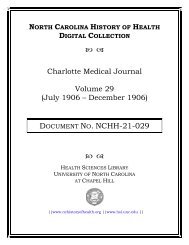
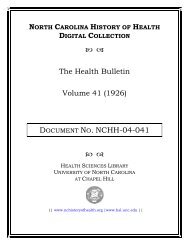
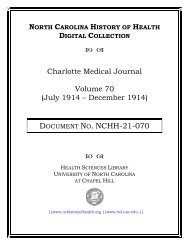
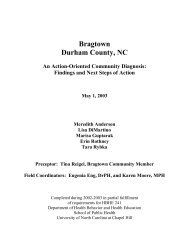
![Bulletin of the North Carolina Board of Health [serial] - University of ...](https://img.yumpu.com/48032016/1/153x260/bulletin-of-the-north-carolina-board-of-health-serial-university-of-.jpg?quality=85)
![The Health bulletin [serial] - University of North Carolina at Chapel Hill](https://img.yumpu.com/47603625/1/169x260/the-health-bulletin-serial-university-of-north-carolina-at-chapel-hill.jpg?quality=85)
![The Health bulletin [serial] - University of North Carolina at Chapel Hill](https://img.yumpu.com/47242858/1/169x260/the-health-bulletin-serial-university-of-north-carolina-at-chapel-hill.jpg?quality=85)
![The Health bulletin [serial] - University of North Carolina at Chapel Hill](https://img.yumpu.com/43204263/1/172x260/the-health-bulletin-serial-university-of-north-carolina-at-chapel-hill.jpg?quality=85)
![The Health bulletin [serial] - University of North Carolina at Chapel Hill](https://img.yumpu.com/41981074/1/163x260/the-health-bulletin-serial-university-of-north-carolina-at-chapel-hill.jpg?quality=85)
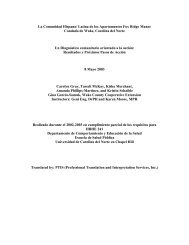
![The Health bulletin [serial] - University of North Carolina at Chapel Hill](https://img.yumpu.com/40912928/1/164x260/the-health-bulletin-serial-university-of-north-carolina-at-chapel-hill.jpg?quality=85)
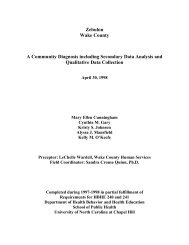
![The Health bulletin [serial] - University of North Carolina at Chapel Hill](https://img.yumpu.com/35643061/1/167x260/the-health-bulletin-serial-university-of-north-carolina-at-chapel-hill.jpg?quality=85)
![Biennial report of the North Carolina State Board of Health [serial]](https://img.yumpu.com/34024350/1/166x260/biennial-report-of-the-north-carolina-state-board-of-health-serial.jpg?quality=85)
